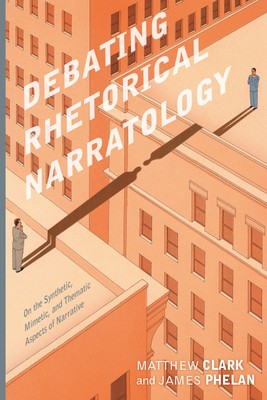
- We will send in 10–14 business days.
- Author: Matthew Clark
- Publisher: Ohio State University Press
- ISBN-10: 0814255779
- ISBN-13: 9780814255773
- Format: 15.2 x 22.9 x 1.4 cm, minkšti viršeliai
- Language: English
- SAVE -10% with code: EXTRA
Reviews
Description
In Debating Rhetorical Narratology: On the Synthetic, Mimetic, and Thematic Aspects of Narrative, Matthew Clark and James Phelan provide a model of lively, sharp, and good-natured scholarly exchange. Clark proposes "friendly amendments" to Phelan's theorizing of the synthetic, mimetic, and thematic aspects of narrative, and Phelan responds, often by explaining why he finds Clark's amendments less-than-friendly. Clark rounds off the debate by offering a brief rejoinder. Clark and Phelan consistently ground their theoretical arguments in their analyses of particular narratives, drawing on a corpus that ranges from Homer's Iliad to Tobias Wolff's In Pharaoh's Army and includes, among many others, Jane Austen's Emma, George Orwell's 1984, and Toni Morrison's Beloved.
Clark and Phelan's deep dive into the synthetic, mimetic, and thematic leads them to explore many other aspects of narrative and narrative theory: style, audiences, the mimetic illusion, fictionality, and more. Their investigation also leads them into questions about rhetorical narratology's relation to other projects in narrative theory, especially unnatural narratology, and, indeed, about how to assess the explanatory power of competing theories. Ultimately, their debate is compelling testimony about the power of both narrative theory and narrative itself.
EXTRA 10 % discount with code: EXTRA
The promotion ends in 23d.03:25:19
The discount code is valid when purchasing from 10 €. Discounts do not stack.
- Author: Matthew Clark
- Publisher: Ohio State University Press
- ISBN-10: 0814255779
- ISBN-13: 9780814255773
- Format: 15.2 x 22.9 x 1.4 cm, minkšti viršeliai
- Language: English English
In Debating Rhetorical Narratology: On the Synthetic, Mimetic, and Thematic Aspects of Narrative, Matthew Clark and James Phelan provide a model of lively, sharp, and good-natured scholarly exchange. Clark proposes "friendly amendments" to Phelan's theorizing of the synthetic, mimetic, and thematic aspects of narrative, and Phelan responds, often by explaining why he finds Clark's amendments less-than-friendly. Clark rounds off the debate by offering a brief rejoinder. Clark and Phelan consistently ground their theoretical arguments in their analyses of particular narratives, drawing on a corpus that ranges from Homer's Iliad to Tobias Wolff's In Pharaoh's Army and includes, among many others, Jane Austen's Emma, George Orwell's 1984, and Toni Morrison's Beloved.
Clark and Phelan's deep dive into the synthetic, mimetic, and thematic leads them to explore many other aspects of narrative and narrative theory: style, audiences, the mimetic illusion, fictionality, and more. Their investigation also leads them into questions about rhetorical narratology's relation to other projects in narrative theory, especially unnatural narratology, and, indeed, about how to assess the explanatory power of competing theories. Ultimately, their debate is compelling testimony about the power of both narrative theory and narrative itself.


Reviews